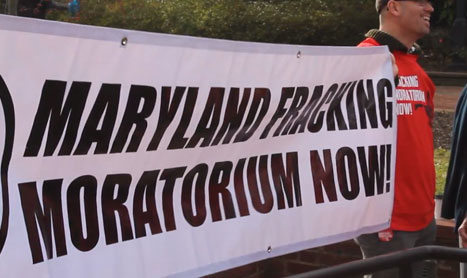By Nate Rabner and Anjali Shastry
Capital News Service
ANNAPOLIS — The Maryland House of Delegates and Senate on Tuesday each passed separate bills that would restrict hydraulic fracturing in the state, over the objections of lawmakers who say the legislation ignores the state’s economic interests.
The House bill, sponsored by Delegate David Fraser-Hidalgo, D-Montgomery, would prohibit the Maryland Department of the Environment from issuing permits for hydraulic fracturing wells until 2018. In the meantime, a panel of experts would study the environmental and public health risks of hydraulic fracturing, also known as fracking.
Several Republican delegates spoke against the bill in the House chamber, claiming it places “hysterical myths” about the dangers of fracking above the needs of Western Maryland’s economy. Some said the bill, which passed by a vote of 93-45, is a way for fracking opponents to ban the practice without explicitly saying so.
“That commission is a travesty,” said Delegate Wendell Beitzel, R-Garrett and Allegany, who argued the state should allow “reasonable, regulated hydraulic fracturing.”
Proponents of the bill voiced concerns about drinking-water contamination from fracking, which involves pumping fluid into the earth to break up natural gas deposits. Delegate Kumar Barve, D-Montgomery, chair of the Environment and Transportation Committee, said his committee “wants to get the science right” before making a decision.
In the Senate, a debate broke out about who should be liable if fracking damages the environment. Senator Bobby Zirkin, D-Baltimore County, sponsored a bill that would hold hydraulic-fracturing companies liable, which was not received well by Senate Republicans.
The bill, which passed with a veto-proof majority of 29-17, would mandate that hydraulic-fracturing companies keep $10 million on hand for insurance and would ensure that state taxpayers are not responsible for funding environmental cleanup after accidents.
State Senator Stephen Waugh, R-Calvert and St. Mary’s, said after the session that Zirkin had not done his due diligence during a committee hearing to hear technical evidence about fracking.
“To say that an activity is inherently dangerous without taking in any evidence for or against is taking a moral judgment and making it a legal decision,” Waugh said.
Waugh and Zirkin had a heated debate after the session adjourned. Waugh said the fracking industry would be on the hook for millions of dollars in damages for incidents that occur anywhere near its activity, while Zirkin countered that negligence would have to be proved first.
Waugh also mentioned that the bill uses the terms “ultrahazardous” and “abnormally dangerous” to describe fracking, which he felt was unfair.
Zirkin said that legally, the two terms indicate a standard of strict liability, and that the bill would ensure that a company would be held liable if it followed industry standards but its equipment malfunctioned.
Each bill will now cross over to the other chamber. If they are successful, they still will need the Republican governor’s signature. Erin Montgomery, a spokeswoman for Gov. Larry Hogan, wrote in an email that “if fracking can be done in an environmentally safe way, then he would want to move forward with it.”
The bills’ opponents believe the legislation would ensure that no fracking company would want to come to Maryland.
“There’s an invisible sign at the border that says gas companies aren’t welcome,” Beitzel said. “That sign became very visible today.”
Zirkin said the logic behind that conclusion was flawed.
“If being held responsible for the problems you cause keeps you out, that’s pretty important for the people of Maryland to realize,” Zirkin said. “Because the only folks who should be worried about this bill are the people who are going to do damage to our people and to the environment.”

